Martin Edwards's Blog, page 70
September 1, 2021
Announcing The Traitor - a new Bibliomystery
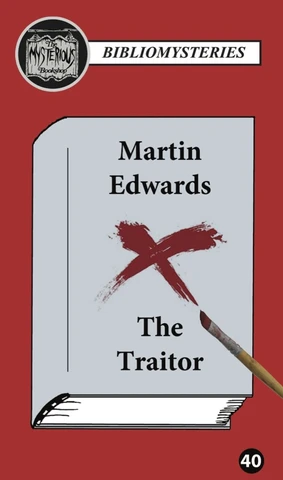
This summer I undertook an interesting project, commissioned by Otto Penzler of The Mysterious Bookshop in New York City. For the past few years, Otto has been publishing a series of limited edition stories which are 'Bibliomysteries' - concerned, in one way or another, with the world of books. A number of wonderful authors - the likes of Ian Rankin, Denise Mina, R. L. Stine, Jeffrey Deaver, Megan Abbott, and Joyce Carol Oates - have featured in the series, so I was flattered to be invited to join them. And as luck would have it, within hours of Otto putting the proposal to me, an idea flitted into my head...
The stories are short, but not very short. The requirement is that they must be at least 10,000 words long and to do with books, but otherwise, the author has free rein. This is liberating. I was conscious that I'd never written a story of this length - almost a novella, you might say - and so here was another interesting challenge. I realised that the story would need to be different from a conventional short story as well as from a novel. The story concept needed to have enough meat in it to justify the length. Luckily, the idea that had sprung to mind fitted the bill.
Otto sent me some illustrative examples of stories in the series, including an Edgar winner from John Connolly and Andrew Taylor's The Long Sonata of the Dead, which supplies a pleasing coda to his wonderful Roth Trilogy. The idea of the series is that they are only available from Otto's bookshop, and that there are limited signed editions as well as paperbacks. The pressure, of course, is to write something good enough to stand in such company...
The result of my labours was The Traitor. This introduces a new character, the 'book detective' Benny Morgan. When lockdown came to an end, my first trips included visits to Llandudno and Shropshire, and both settings feature in the story. It's a mystery concerned with obsessive book-collecting and I really did enjoy writing it. Publication is in September and further details may be found here
Murder She Drew - A Japanese Perspective on John Dickson Carr
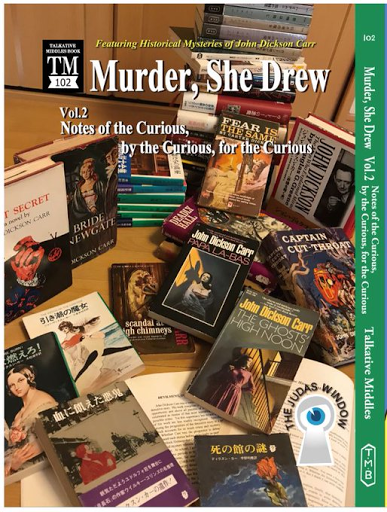
I've talked before about the pleasure I take in hearing from readers of my books, and of this blog, around the world. Some time ago, quite out of the blue, I received a message from Akira Moriwaki of Japan about a fascinating project of his connected with the works of the locked room king, John Dickson Carr. One thing led to another, and I'm now the proud possessor of an inscribed copy of Murder, She Drew: Notes of the Curious, by the Curious, for the Curious by Akira and two other talented Japanese Carr enthusiasts. What is more, I have a couple of maps of scenes from Carr's work, in London and New Orleans respectively, which are so lovely to look at that I've had them framed and they now hang on the wall alongside a number of other prints with crime writing associations.

The authors are now branching out, and I'm delighted to host a short guest blog post from them about their latest activities. Over to Akira Moriwaki:
'Murder, She Drew: Notes of the Curious, by the Curious, for the Curiouswas the first attempt in the world to review John Dickson Carr's historical mysteries and illustrate it with crime scenes and maps. Fortunately, this project was unexpectedly well received, both in Japan and abroad. This was due, in no small part, to the fact that the illustrator, who was the 'She' in the title and had previously read very few of Carr's novels, was awakened to Carr's charms.
We are pleased to announce a new challenge: Carr Graphic. It is a far-reaching project to make Carr's works into a Graphic in the "SR (=Sealed Room) no Kai", the longest established mystery novel enthusiasts' group in Japan, to which the three co-authors belong. This is the result of the illustrator's love for Maestro Carr.
This project will be published in the SR Monthly magazine on even-numbered months and in the SR Blog on odd-numbered months. Both the paper and the blog will be linked together to form a series of pieces.
The first piece, It Walks by Night, was published last month in the June issue of SR Monthly.
The first SNS piece, The Lost Gallows, was published at the following address. http://sealedroom.blog.jp/
August 30, 2021
Fen Country - and Murder by the Book
 Murder by the Book includes an Edmund Crispin story that previously appeared in his posthumous collection Fen Country, so it was perhaps appropriate that an event to celebrate the publication of the latest British Library Crime Classic anthology should be held in Ely, at the heart of the fenlands. The event was organised by Toppings, who have a lovely bookshop in the centre of the little city. I've visited Ely only once before, , and given the length of the journey from Cheshire, it made sense to turn the event into the centrepiece of a staycation, and to spend more time in a fascinating part of England.
Murder by the Book includes an Edmund Crispin story that previously appeared in his posthumous collection Fen Country, so it was perhaps appropriate that an event to celebrate the publication of the latest British Library Crime Classic anthology should be held in Ely, at the heart of the fenlands. The event was organised by Toppings, who have a lovely bookshop in the centre of the little city. I've visited Ely only once before, , and given the length of the journey from Cheshire, it made sense to turn the event into the centrepiece of a staycation, and to spend more time in a fascinating part of England.
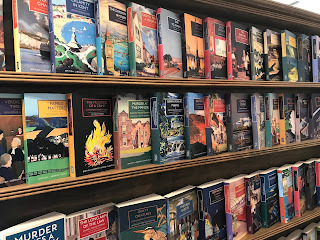

The event itself was held in St Peter's Church, and the layout of the pews allowed for social distancing. Toppings served coffee and cake, and we all tucked in with enjoyment. I was interviewed by David Learner, a former actor whose roles included Marvin the Paranoid Android in The Hitch-Hiker's Guide to the Galaxy. David did a great job and the afternoon passed very enjoyably indeed, not least because there were many books to sign! I was also delighted to have the chance of an extended chat afterwards with a good friend of this blog, Clint Stacey.


Exploring Ely was very enjoyable. A boat trip on the Great Ouse and a visit to Ely Country Park were among the highlights. Ely is a relatively isolated place, with a rich history and I can imagine that lifestyles there are often tranquil and relaxing. David is very keen on the city, and it's easy to understand why. Of course, having a good bookshop close at hand is a real plus...


We spent an afternoon wandering around nearby Wicken Fen, a place rich in wildlife, and while wandering through the reeds, I came up with a very visual idea for the opening chapter of my next novel. So - definitely inspirational! That idea doesn't involve the fens in any way, but I must admit I'm now tempted to set a short story or a scene in a novel there. On the way home, we also went around the grounds of Anglesey Abbey - which is a very long way from the Anglesey I'm familiar with - and again that was fun to do. Luck with good weather always helps on a trip like this, and I'd have had a good time even if nobody turned up for my event. The fact that people came from quite far-flung places was a real bonus, and underlined the appeal of classic crime fiction.
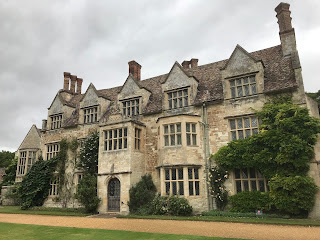
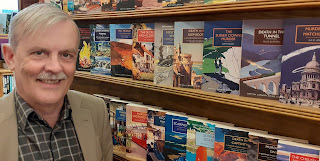
August 29, 2021
Caroline Todd R.I.P.
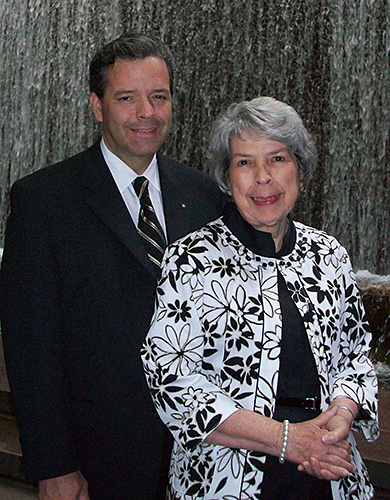
I was deeply saddened yesterday to learn of the death of Caroline Todd, a delightful person and a gifted writer in collaboration with her son Charles. I've greatly enjoyed Caroline's company, along with that of Charles and her daughter Linda, on many occasions, both in Britain and the United States, and I was in touch very recently to pick their brains about the pros and cons of collaborative crime writing for a course that I'm working on right now.
I first became aware of the name of Charles Todd (the name under which the mother and son duo wrote) twenty-five years ago, when I delighted in their first historical mystery featuring Inspector Rutledge, A Test of Wills. The popularity of that book paved the way for a long and successful career. Their love of England shone through in their writing: it's not easy to capture the sense of a foreign country in a long series of novels, but they achieved this thanks to meticulous research and a great deal of empathy.
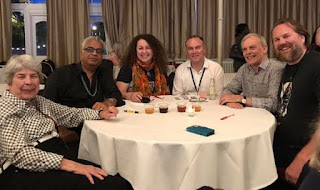
The first time I had a long conversation with Caroline was, as far as I can remember, in Baltimore, at the 2008 Bouchercon, when we appeared on a panel together. After that there were many enjoyable encounters. We were, for instance, on a quiz team together at Harrogate a couple of years ago (above photo), and Caroline also took part in 'Forgotten Authors' panels at CrimeFest. I also remember a memorable dinner at Malice Domestic in 2014, along with the actor-writers Melodie Johnson Howe and Kathryn Leigh Scott, while Charles and Caroline were guests of mine at a table at the Agatha awards banquet a couple of years later when The Golden Age of Murder won the prize.
Four years ago, when I agreed to give a talk in Grasmere to a group of Americans visiting the Lake District, I was surprised and delighted to find that their number included Caroline and Charles, who were on another research trip - as I say, they researched expertly and extensively together. I've also had the pleasure of including their stories in anthologies; their contributions were always entertaining and highly professional.
All our get-togethers were happy ones, because Caroline was a woman of charm, intelligence, and kindliness. She and Charles were due to be guests of honour at the Anthony Awards last night and warm tributes were paid. In particular, Hank Philippi Ryan spoke very movingly about Caroline's personal qualities and literary gifts in a memorable and fitting tribute. I shall miss her and my sympathies go to her family and particularly to my dear friends Charles and Linda, whose loss is so great.
August 27, 2021
Forgotten Book - No Through Road
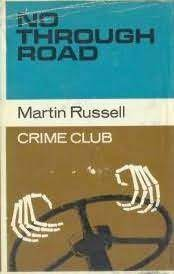
Martin Russell was a capable crime novelist who enjoyed a long career yet remained relatively low-profile. His retiring personality perhaps helps to account for this. In addition, although he wrote a short series featuring the journalist Jim Larkin, he concentrated on stand-alones which were published consistently over the years in the Collins Crime Club but seldom appeared in paperback.
He made his debut with No Through Road in 1965 and it's an intriguing and unusual crime novel. The first part of the story is told in the first person by Arthur Whitlock, who is driving north and clearly escaping from something - but what? Later sections are told in the third person as he comes into contact with the police. It's not easy to say much more about the storyline for fear of giving spoilers.
Whitlock is a meek individual but we learn he's enjoyed considerable success (although rather fleeting) as a playwright. He has been besotted with his much younger wife Gwenda, but the marriage has proved disastrous in various ways. I detected the influence of Simenon on the writing - something not so evident in Russell's later novels, or at least those I have read.
This is quite an ambitious novel, and I can see why Elizabeth Walter, the long-serving Crime Club editor, picked it up. Despite a good deal of unevenness, there are some interesting ideas in evidence. That said, I don't think the novel can be accounted a great success - as Kirkus Reviews said, it's a bit too strident, but it does 'manage a fair amount of pace and pressure'. The psychological aspects of the story didn't strike me as entirely convincing, and the same could be said of the police characters, but there are plenty of glimpses here of the capable writer that Russell would become.
August 25, 2021
Rebecca 2020 film review
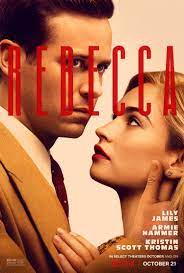
Ben Wheatley's decision to remake the Hitchcock classic Rebecca was, depending on your viewpoint, courageous or foolhardy, but he's been quite clear in interviews that his focus was on filming Daphne du Maurier's novel rather than reinterpreting the Master of Suspense and I think that was sensible. His film is no masterpiece, I'm afraid, but it ranks as solid entertainment.
In some ways, the best part of the movie comes in the early scenes, as we find the heroine (Lily James, very well cast) oppressed by her dreadful employer Mrs Van Hopper (Ann Dowd, who is terrific) and entrancing wealthy and moody Maxim de Winter, who is coming to terms with the death of his wife, Rebecca. Maxim is played by the American actor Armie Hammer, and this is a casting choice that I found odd and unsatisfactory. Maxim's weird mustard-coloured suit made a more immediate impression on me than the man himself. It would be absurd and unfair to compare him to Laurence Olivier, but I feel sure there must have been stronger candidates for the tormented character of Maxim.
The main action then shifts to Cornwall, and the de Winter house, Manderley. Filming took place in Devon rather than Cornwall, apparently, and more than one house was used to create the Gothic mansion where Rebecca's ghost figuratively stalks the corridors. We're introduced to the housekeeper, Mrs Danvers (one of the great villains in fiction) who was besotted with Rebecca and hates her successor. Kristin Scott Thomas tackles the role with icy zeal, and is compelling throughout. Alas, Sam Riley is far less memorable as Jack Favell than was George Sanders in the Hitchcock version.
The script is workmanlike, but given the strength of the source material, one would have hoped for more. There's a 21st century attempt to make Maxim's new wife more active and less of a victim in the later scenes, but it doesn't work very well. I am definitely not one of those who thinks that Rebecca shouldn't have been filmed again and I did find this version enjoyable viewing. But it's simply not as good as it might have been.
August 23, 2021
Many Deadly Returns - the launch trip
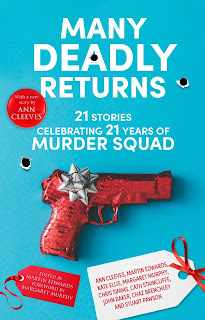
After a very, very long wait, I've finally enjoyed an in-person book launch once again. This was a highlight of a trip to the North East last week, and involved meeting up with my colleagues in Murder Squad to celebrate the publication of our fourth anthology. Many Deadly Returns celebrates our 21st year as a writers' collective. Margaret Murphy, our founder, Ann Cleeves, Cath Staincliffe, and I have been there since the beginning. John Baker and Chaz Brenchley have retired, while Stuart Pawson sadly died, but we've been joined by Chris Simms and Kate Ellis.
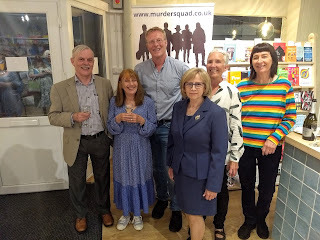
Many Deadly Returns includes three stories from each of the six current members, plus one from each of the former members. I've edited the book and my three stories are: 'The Other Ones', 'Lucky Liam', and 'Bad Friday'. Of this trio, 'The Other Ones' is brand new, while 'Bad Friday' has only previously appeared in the United States. The book is published by Severn House here and in the US, and there's been a very positive early review from Kirkus, which has put us in very good heart.
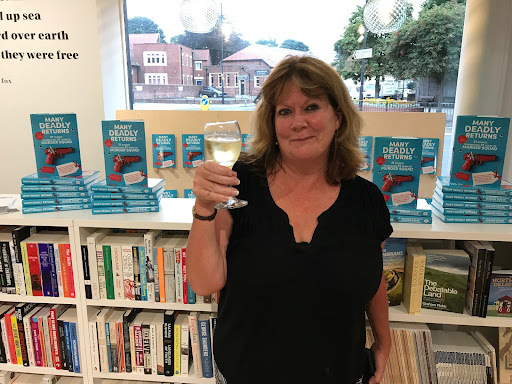
Our editor, Kate Lyall Grant from Severn House (who many moons ago published two of my Harry Devlin novels when she and I were with Hodder) was, happily, able to join us for dinner, followed by the launch, which was hosted by Forum Books in Whitley Bay. There was fizz to drink and a wonderful Murder Squad cake, all contributing to a very convivial evening in which our book flew off the shelves. How good it was to be able to take part in a live event again. Zoom is invaluable in many ways, but Zoom get-togethers, although definitely far better than nothing, are not quite the same.

I also got back into my habit of turning the visit into a sightseeing trip. Northumberland is a county I like a lot, and there are plenty of places I'd love to explore. I made a start by visiting Seaton Delaval Hall, a burnt-out husk designed on the grand scale by Vanbrugh, and with lovely grounds, and even better, taking a boat trip from Seahouses to the Farne Islands, which was really memorable: see the pictures below. Other stops included Alnwick (with its fantastic Barter Books) and Alnmouth and, on the way up to the north east, Sedbergh and Kirkby Stephen. As a whole, the trip felt like re-entering the real world after a long, dreamy slumber.



August 20, 2021
Forgotten Book - The Plot against Roger Rider
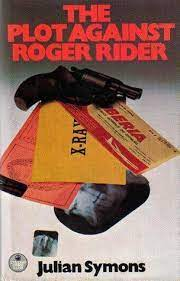
After finding A Sort of Virtue, Julian Symons' final novel, rather a let-down, I went back to one of my favourites among his eclectic works. This is actually the third time I've read The Plot against Roger Rider. First time around was not long after the original publication in 1973, and the plot twist blew me away. The second time was twelve years ago and resulted in one of my early . Rather than rehash what I said before, let me take a fresh look at the book's strengths and weaknesses.
The latter were hinted at in Edmund Crispin's review in the Sunday Times, which found 'too many abrupt changes of viewpoint, and a certain amount of peripheral material which seems perfunctory'. Because the story is told from numerous different perspectives (with bits of omniscience added to the mix as a means o building suspense), it isn't easy to find someone to identify with, though young James Paradine eventually emerges as an effective amateur detective. One character's preoccupation with the Russian Royal Family doesn't add anything to the story, an example of that perfunctory peripheral material Crispin mentioned. There's also a brief passage where Symons slips into the present tense for no apparent reason. Today, I think, the main weakness is the treatment of sex and sexual orientation. In this respect, the story seems dated and unsatisfactory.
In Symons' defence, some of this arises from his use of sexual attraction between characters as a means of misdirecting the reader from what is really going on. And as Crispin says, the novel offers 'considerable rewards - audaciously intricate contrivance, lucid, sinewy prose, characters who spring to life with the first sentence they utter, variegated backgrounds (London, Spain, Sardinia) and a stimulating shock ending whose only fault is that it is possibly a little too frailly prepared.' Is this last remark fair comment? Arguably, but on the whole, I'd say the preparation is sufficient, even though the hints about the truth are rather oblique. The characterisation, as often with Symons, is crisp and generally effective, while the presentation of Spain under Franco is rather interesting.
When reading the book this time, I've focused on the craft of the writer, trying to figure out how Symons set about putting together the disparate ingredients of this complicated mystery.I don't want to give spoilers, because it's a novel well worth reading and the final twist is definitely gasp-inducing and memorable, but my guess is that two of the real life crimes referenced in the text provided important raw material, and that the key concept was that of a 'biter bit' conspiracy. If that's right, he will have had his solution in mind at the outset, and then had to make decisions as to how to build up interest in the relationships between the central characters. I sense that he may have struggled with this - he wasn't entirely happy with the book - and this explains the faults that Crispin identified. But having read the novel three times, I remain a fan.
August 18, 2021
Writing Short Stories: Part 2 - guest post by Art Taylor

Today, Art Taylor resumes his discussion of the craft of writing short stories (and mentions one of my own favourite authors of short stories, the brilliant William Trevor) :
'In Part I of this essay, I suggested some of the benefits of writing long first drafts of short stories to improve the quality of the final, shorter ones. But should writers do this?
As I tell students in my workshops at George Mason University, the strongest characters don’t exist solely in a scene or a moment, stepping off into nothingness; instead, the reader should feel that their lives extend well before the first line of the story, well after the final one (if they’re lucky!), and beyond the borders of any single page.
There are several technical ways to accomplish these gestures toward the larger world. A stray detail in a line of dialogue, a brief ramble through memories in a passage of interiority, even a bit of backstory directly presented in a line of exposition (that last in moderation)—these moves allow you to take elements which might have been part of a longer manuscript and sneak them around the edges of a streamlined revision. In his terrific craft book Thrill Me, Benjamin Percy suggests slipping a small reference to backstory into the predicate of a sentence—an exercise I now assign in class.
Admittedly, writing a full novel to earn the raw material for a short story isn’t efficient. Writers could also sketch out notes about a character’s history, their dreams, their fears, etc. to pluck from as needed for the story itself. Another tactic: Sketch a chronological list of every event that has some impact on the story, then start the storytelling itself near the end of that chronology, trying to infuse the plot with the weight of the larger history.
One of my own favorite short story writers, William Trevor, used the word “distillation” to describe the short story—a word that’s stuck, in terms of both purification and extraction. Taking something that’s fuller and condensing it and reducing it until what you’ve got is exactly what you need, no more, no less, and in its richest form.
High potency, small doses. That’s something to aim for, however you might get there.'
Art Taylor is the author of The Boy Detective & The Summer of ’74 and Other Tales of Suspense (Crippen & Landru, 2020). His fiction has won the Edgar Award and the Anthony Award, as well as multiple Agatha, Derringer, and Macavity Awards. He’s a professor at George Mason University in Fairfax, VA. Find out more about his work at www.arttaylorwriter.com.
August 16, 2021
Writing Short Stories - part 1: guest post by Art Taylor
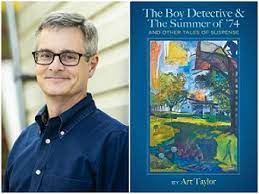
Over the past few years, I've valued the friendship of the American writer Art Taylor, who is not only a novelist but also a highly distinguished, multi-award-winning author of short stories. My guess is that the time is coming, if it hasn't already arrived, when Art will be hailed as the finest American author of crime short stories since the great Stanley Ellin. Like me, Art is fascinated by the craft of crime writing and I was thrilled when he offered to contribute a typically thoughtful piece about writing short stories. Here's the first of two instalments:
'My essay “The Short Mystery” for How to Write a Mystery: A Handbook From Mystery Writers of America focusses on three principles as guidance for writing short mystery fiction: economy, efficiency, and focus. So my suggestion here might seem contradictory: To write successful short fiction, write long.
More by accident than by design, the first drafts of my own short stories are frequently significantly longer than the final versions. The earliest draft of my story “The Boy Detective & The Summer of ’74” was only 3,500 words (back in 1994!), but it ultimately ballooned into a major strand of an abandoned novel, then into a standalone novella, and finally into a smaller tighter novella of 11,000 words—the version ultimately published last year in Alfred Hitchcock’s Mystery Magazine. Another story—“Mrs. Marple and the Hit-and-Run”—began as a 10,000-word story, but when I read the original draft aloud to a beta audience, I felt its bloat and sluggishness. The final, published version clocked in at a sleek 2,500 words.
A key point, however: In reducing a strand of a novel to a shorter novella and in cutting 75% of that second story, I didn’t ultimately delete any of the major components of the earlier drafts. Those elements remain—hinted at, gestured toward, folded in at the corners—and I think (hope!) each published story is stronger precisely because of the words that were discarded.
Writing long helps to “flesh out” (that worn-out phrase) some of the skeletal aspects of a draft, enhancing an understanding of the characters, of their wider world and their place in that world, and of the longer chain of events both before and after the main action of the story. More, more, more in all directions—hopefully toward the richness and complexity of the readers’ experience too.
However—and it’s a big however—the short story doesn’t ultimately succeed on the concept of more more more but on those principles of economy, efficiency, and focus.
So how does more become less? And how can that less do more? Thanks to my host Martin Edwards, there’s a Part II of this post ahead, addressing just those questions.'



